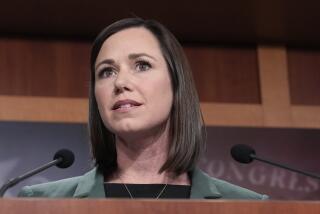The Extended Hand Extends No More : Poverty: The poor must organize to restore the nation’s political conscience.
- Share via
Thirty years ago, the persistent condition of poor people in America gave birth to the War on Poverty. Having enjoyed two decades of economic prosperity, the country was disposed to extend assistance to those who did not benefit from that growth. Americans embraced both the spirit and purpose of those social programs with the best of America’s values, intentions and tradition. The economic gains shared by many prepared the nation to hear and heed the voice of its collective conscience.
Today, the rewards and benefits of economic growth are enjoyed by fewer people. While stock prices, corporate profits and productivity have climbed steadily, real wages have fallen.
The top 1% of households control 40% of the nation’s wealth. During the 1980s, 75% of the income growth and 100% of the increase in wealth went to the richest 20% of the population. Over the last 20 years, the poorest 20% of the population has seen its household income decrease on average nearly 1% per year in inflation-adjusted dollars.
During those 20 years, many of those in the middle have steadily slid toward the bottom. So when the political tides turn swiftly against the poor--as in current welfare reform legislation and the proposed federal budget--those left in the middle are inclined to do little more than watch as the tides sweep away those clinging to the rungs below.
The goodwill fueled by shared economic prosperity has vanished in 1995. With it, America’s social contract with poor families and children is nearly dissolved. We have come face-to-face with a clear moral challenge. And it is within a moral context that we must envision and create our future.
In what will perhaps be the most enduring teaching given to us by Pope John Paul II, the principle of solidarity enables us to see the “other”--whether a person, people or nation--not just as an instrument with a work capacity and physical strength to be exploited and then discarded when no longer useful, but as our neighbor, to be offered a share on a par with ourselves in the banquet of life to which all are equally invited by God.
The systematic dismantling of social programs by Congress communicates to those who are truly entitled to benefit from these programs that their well-being is negotiable. It ignores the notion of solidarity by claiming that while all may be invited to the banquet of life, not all will actually get a place at the table.
Poverty has a human face. More often than not, it is the face of a child. Legislators should have been forced to look into the eyes of the little ones who will suffer most from this reform before a single vote was cast.
So-called reformers have been driven to “end welfare as we know it.” But until there is a moral and political commitment to change the conditions that force families and children to seek public assistance, the “reforms” passed by Congress will do nothing to better the lives of poor people.
Over the past 25 years, this notion of solidarity has been given life by community organizations across the country funded by the Campaign for Human Development. Founded in 1970 by the U.S. Catholic Conference, the campaign has provided resources to poor people who organize to eradicate the conditions which impose poverty.
If the principle of solidarity is to take hold, it will not happen by legislation. Instead, the conversion from individualism to solidarity will happen when people in neighborhoods and communities join together to find common ground which crosses racial, ethnic and economic lines.
To make solidarity a working principle, those who have been factored out of the political equation or blamed for a myriad of social ills must be seated at the table and to do this, they must become organized. The welfare and budget debates show once again that those without political muscle or financial clout to guarantee access to decision-makers will be left off the playing field. They will enter the debate only when they acquire the skills and training to engage effectively in the political process.
Where do we go from here? We cannot wait in hope that economic prosperity in the future will once again create goodwill embodied in help for those most in need. The conscience of the nation must once again be pushed into action. In the absence of political leadership, organized poor people--driven by a vision of solidarity--will have to lead the way.
More to Read
Get the L.A. Times Politics newsletter
Deeply reported insights into legislation, politics and policy from Sacramento, Washington and beyond. In your inbox twice per week.
You may occasionally receive promotional content from the Los Angeles Times.








